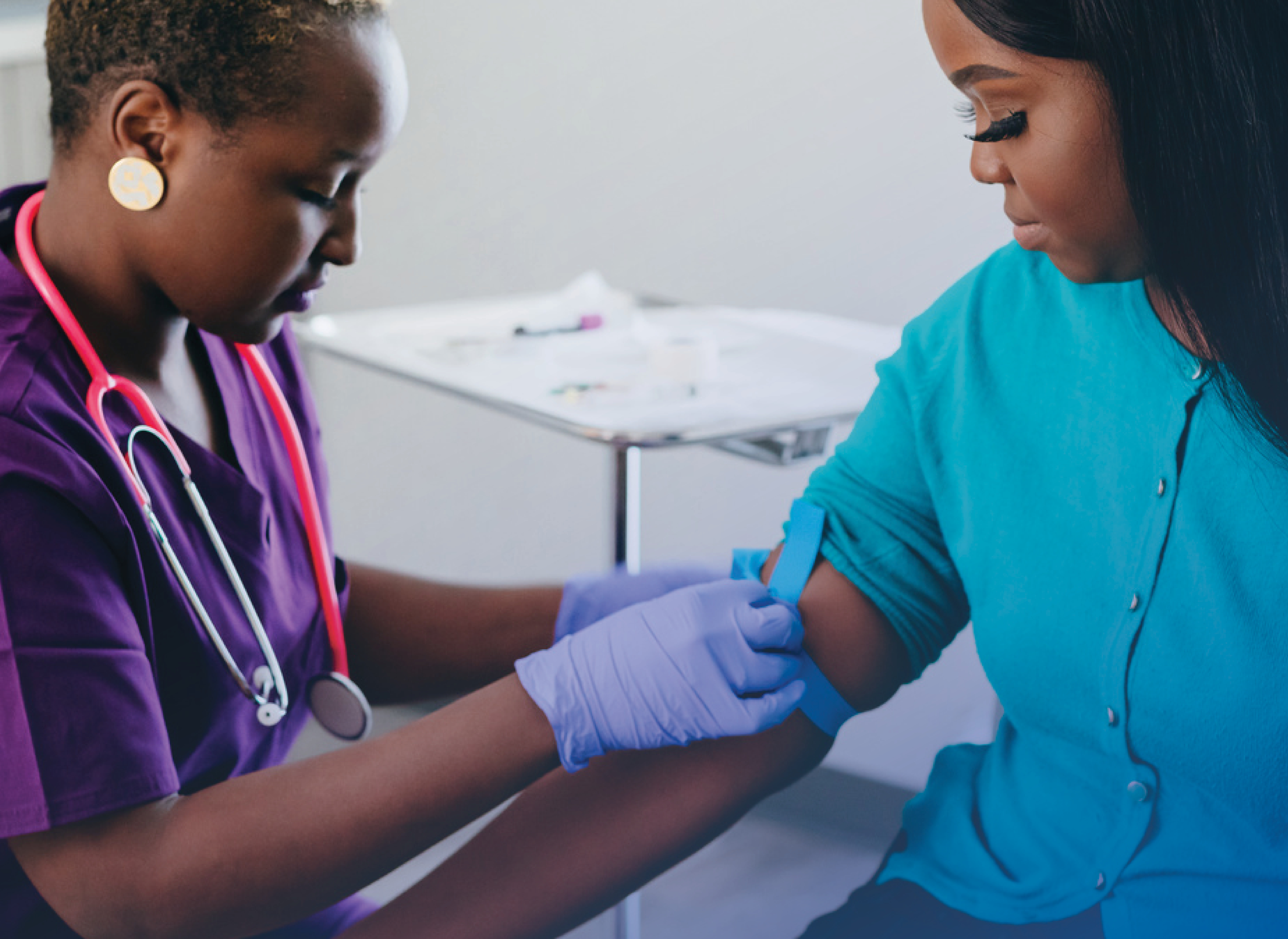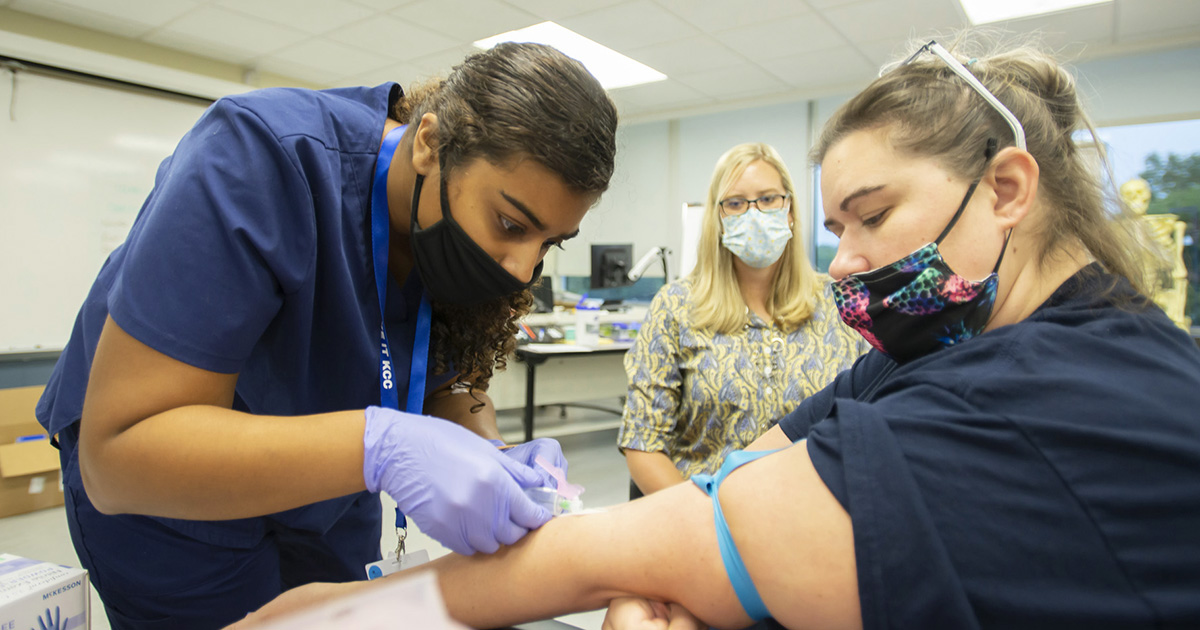Phlebotomy Classes Near Me: A Checklist Before You Enroll
Wiki Article
The Path to Qualification: Recognizing the Phlebotomy Training Course Trip and Its Significance
As you take into consideration the path to qualification in phlebotomy, it is very important to comprehend the role you'll play in medical care. Your training will certainly cover essential skills, from blood collection techniques to patient communication. Each element of the program prepares you for the obstacles ahead. However just what does the trip involve, and why is accreditation so essential for your future occupation? Let's check out these inquiries additionally.
The Duty of Phlebotomists in Healthcare
Phlebotomists play an essential role in the medical care system, acting as the vital link in between people and crucial diagnostic screening. You'll carry out blood attracts, guaranteeing examples are collected properly and securely. Your expertise assists in detecting medical problems, checking wellness, and leading treatment choices.In your day-to-day interactions, you'll require to establish depend on with individuals, making them feel comfy throughout what might be a demanding experience. You are accountable for classifying and handling examples carefully to stop contamination or mistakes, which might influence examination outcomes.
Yet, you'll frequently work alongside physicians and registered nurses, connecting important details concerning individuals' problems. Your function is essential in maintaining the operations in healthcare settings, making sure timely and accurate outcomes. By understanding your abilities, you add meaningfully to client treatment, making you an essential part of the medical group. Welcoming this duty is key to your success as a phlebotomist.
Summary of Phlebotomy Training Programs
When exploring phlebotomy training programs, you'll locate various kinds designed to fit different schedules and learning styles. Each program helps you establish essential skills like blood collection and person interaction. Recognizing these alternatives is vital to picking the best course for your profession.Types of Training Programs
Numerous types of training programs are readily available for those looking to end up being efficient in phlebotomy. Additionally, some healthcare facilities and centers offer on-the-job training programs, offering sensible experience while you discover. Whatever course you choose, each program aims to equip you with the needed abilities for an effective phlebotomy job.
Secret Abilities Created
Grasping phlebotomy requires a collection of essential abilities that are created with extensive training programs. Furthermore, interaction abilities are basic; you'll need to engage with people, describe treatments, and put them at simplicity. Each of these skills is necessary for your success as a certified phlebotomist, making you a valuable possession in any kind of healthcare setup.Secret Parts of a Phlebotomy Course
In a phlebotomy training course, you'll focus on essential subjects that lay the foundation for your future job. You'll participate in hands-on training that enables you to apply what you've discovered in real-world settings. Both the curriculum and functional experience are crucial for your success as a phlebotomist.Core Curriculum Summary
While seeking a phlebotomy training course, you'll encounter a core educational program made to furnish you with basic skills and understanding. Phlebotomy Courses Near Me. This educational program commonly consists of makeup and physiology, concentrating on the circulatory system and recognizing blood parts. You'll additionally learn about various types of blood collection methods, including venipuncture and capillary slit techniquesFurthermore, infection control and security protocols are important parts, guaranteeing you understand how to keep a sterile setting. You'll research patient interaction, highlighting interaction and compassion, which are critical for relieving individual stress and anxiety.
Hands-On Training Experience
Obtaining hands-on experience is a crucial part of your phlebotomy training course. This sensible training permits you to apply what you've discovered in a real-world setting, enhancing your skills and confidence. You'll exercise venipuncture methods, find out just how to take care of different kinds of specimens, and get accustomed to the devices made use of in the area. Under the support of experienced instructors, you'll improve your abilities, ensuring you're gotten ready for any type of situation you may face.In addition, you'll obtain the possibility to interact with patients, which is vital for establishing your interaction abilities. This combination of technical proficiency and social skills is critical for your success as a certified phlebotomist. Ultimately, hands-on training is where concept fulfills method, solidifying your expertise and readiness for certification.
Certification and Licensing Demands
Prior to you can begin your profession in phlebotomy, it is vital to comprehend the certification and licensing needs that vary by state. The majority of states need phlebotomists to hold a certification from a recognized organization, such as the National Phlebotomy Organization or the American Culture for Scientific Pathology. These accreditations normally entail passing a test that evaluates your expertise and abilities in the field.In enhancement to accreditation, some states have specific licensing needs. You might need to finish a specific variety of hours in scientific method, submit evidence of training, or undergo a background check. It is very important to investigate your state's guidelines to see to it you meet all essential requirements.
Remaining informed about these demands not just assists you secure a placement however additionally enhances your reputation as a professional. By satisfying these demands, you'll be well on your way to a successful see this site job in phlebotomy.
Hands-On Training and Practical Experience
Hands-on training and sensible experience are vital elements of your phlebotomy education, as they allow you to use academic expertise in real-world scenarios. During your training, you'll involve in monitored venipuncture, find out proper methods, and end up being acquainted with different blood collection equipment. This straight involvement is vital for building your self-confidence and refining your abilities.You'll work very closely with experienced specialists that can direct you through the subtleties of individual communication and sample handling. Each session not just enhances your understanding however likewise prepares you for the busy setting of healthcare setups.
Additionally, many programs integrate professional turnings, enabling you to experience diverse settings, from hospitals to outpatient centers. This direct exposure assists you adjust to different obstacles and patient needs, ensuring you're well-prepared for your future duty. Welcome these possibilities, as they're vital to ending up being an experienced and compassionate phlebotomist.
Difficulties Faced Throughout Training
While obtaining hands-on experience is essential, it's important to recognize the obstacles that can occur throughout your phlebotomy training. Additionally, understanding the abilities required for blood draws takes practice; you may have a hard time with method initially.Time administration can also be a difficulty, as harmonizing concept, functional sessions, and personal dedications can feel challenging. You may deal with varying finding out rates amongst your peers, see this page resulting in feelings of self-doubt if you think you're falling back. Adjusting to the various individualities of instructors can be difficult, as each may have a special training design.
Recognizing these barriers beforehand can prepare you for success and help you establish durability throughout your training trip.
Career Opportunities After Qualification

As you get experience, you could even think about specializing in locations like pediatric or geriatric phlebotomy, catering to certain client requirements. Some phlebotomists select to advance their jobs by ending up being laboratory professionals or going after more education and learning in medical care fields.
Furthermore, your qualification can lead to duties in training or overseeing brand-new useful source phlebotomists, allowing you to share your knowledge. With the healthcare industry continuously expanding, your skills will always be in need, leading the way for a secure and fulfilling occupation. Welcome the opportunities waiting for you!
Frequently Asked Inquiries
What Is the Normal Duration of a Phlebotomy Training Training Course?
Phlebotomy training courses normally last around 4 to eight weeks. You'll engage in hands-on method, class direction, and on-line discovering. Finishing this training prepares you for certification and a gratifying occupation in medical care.Are Online Phlebotomy Courses Available?
Yes, on the internet phlebotomy training courses are readily available. They provide flexibility and comfort, allowing you to research at your own pace. Simply confirm the program is certified to fulfill accreditation requirements and obtain valuable skills for your job.Just How Much Does Phlebotomy Training Typically Price?
Phlebotomy training usually sets you back between $700 and $2,500, depending on the program and area. You need to consider aspects like course size, consisted of products, and hands-on experience when selecting the best training for you.What Prevail Requirements for Phlebotomy Training?
Common prerequisites for phlebotomy training usually consist of a secondary school diploma or GED, immunizations, and a background check. Some programs might also require basic medical care understanding or certifications, guaranteeing you're planned for hands-on training.Can I Work While Finishing My Phlebotomy Training?
Yes, you can function while finishing your phlebotomy training. Many pupils balance jobs with their research studies, however ensure to manage your time effectively to guarantee you meet both job and training commitments successfully.Report this wiki page